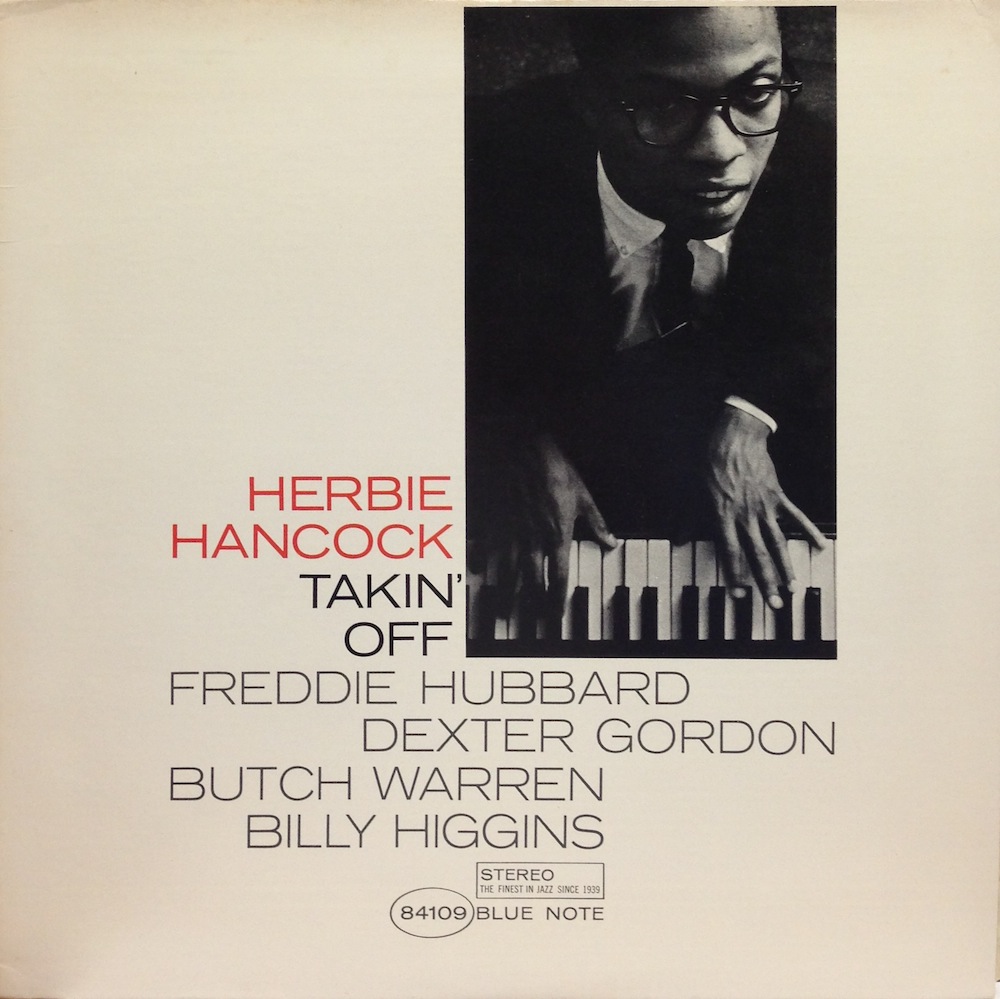With the authority of a seasoned jazz personality, Herbie Hancock delivered his Blue Note debut as a leader in 1962, Takin’ Off.
Personnel
Herbie Hancock (piano), Freddie Hubbard (trumpet), Dexter Gordon (tenor saxophone), Bob Cranshaw (bass), Billy Higgins (drums)
Recorded
on May 28, 1962 at Van Gelder Studio, Englewood Cliffs, New Jersey
Released
as BLP 4109 in 1962
Track listing
Side A:
Watermelon Man
Three Bags Full
Empty Pockets
Side B:
The Maze
Driftin’
Alone And I
Astunning hard bop debut that hinted at post bop things to come. Around 1962, front-line hard boppers, particularly at Blue Note headquarters, were steadfastly developing an ear-catching dialect to the language of jazz. In hindsight, it is beautiful proof of the all-inclusive nature of jazz that these developments, plus gospel-drenched hard bop, plus the major happenings of the day (the envelop-pushing of Ornette Coleman, John Coltrane, McCoy Tyner, Bill Evans), ran a simultaneous course. The stakes were raised and young Hancock wasn’t about to perform below par. His confident playing and composing amidst a bunch of top-rate, contemporary players, including ‘comeback’ legend Dexter Gordon, is striking.
A year later, Miles Davis, another major jazz force, would ask Hancock to join his group, the stellar one which included Wayne Shorter, Ron Carter and Tony Williams. Jazz at a peak, not least because of Hancock’s innovative harmony, voicing and rhythm. During his period with Miles Davis, as is well documented, Hancock himself would deliver albums on Blue Note that defined the post bop style and remain influential to this day, notably Empyrian Isles in 1964 and Maiden Voyage in 1965. A succesful career path was laid out that would include the fusion of his Mwandishi group, the jazz funk of Headhunters and much, much, celebrated more up until the 21-st century’s schizoid present.
Clearly, an experimental spirit had fared into the bespectacled Hancock who peered at your open zipper on the cover of Takin’ Off. It depicts a gentleman whose attire oozed the impression of a kid that fills his evenings with chemistry tests in his granny’s attic. At the dawn of the sixties, the prodigy was taken under his wings by trumpeter Donald Byrd. Prior to Takin’ Off, Hancock debuted as a recording artist on Byrd’s Royal Flush, followed by the Donald Byrd/Pepper Adams Quintet’s Out Of This World and Byrd’s Free Form.
Takin’ Off’s opening cut, the gospel-tinged groover Watermelon Man (turned into a hit by Mongo Santamaria soon after Hancock’s release), sounds as fresh today as in 1962. Many highlights: for one, the infectious rhythm of Billy Higgins is unforgettable. A gritty vibe without the use of the backbeat. Could it be that the island blood in Higgins’ veins accounts for his inventive rhythm? (Other drummers had Carribean ancestors, among them Denzil Best and Mickey “Granville” Roker) Billy Hart (coincidentally, the drummer of Hancocks Mwandishi group) offers a welcome view in an interview with Ethan Iverson on his Do The Math blog. Hart remembers asking Billy Higgins repeatedly about the ‘Higgins island flavor’. Higgins always answered matter-of-factly: “I studied with Ed Blackwell, you know.”
Dexter Gordon’s carefully crafted, behind-the-beat blues story is also a big treat. It blends well with Hancock’s ready and able piano comping, while Hancock includes in his poised solo a number of gorgeous, rollicking cadenzas suggesting both Earl Hines and Maede Lux Lewis. The sound of the piano is round, transparent and upfront, as if Hancock’s playing beside you at the bar. Splendid acoustics at the high-roofed joint in Englewood Cliffs, courtesy of the recently deceased master of modern jazz engineering, Rudy van Gelder.
The inclusion of Dexter Gordon on Takin’ Off has been an obvious delight to many, yours truly included. Gordon, fresh in the act of an iconic comeback on Blue Note in the early sixties after a troubling, preceding decade that was largely wasted on stints in prison (with early May dates Doin’ Alright and Dexter Calling in the pocket) hits a homerun in The Maze, a tacky tune that swings while incorporating McCoy Tyner’s orchestral voicings. This period saw the influence of John Coltrane on Gordon, whose early sides, strikingly, had captivated Coltrane. Insidiously, Gordon’s resonant, fluent solo in The Maze reaches boiling point. Majestic. Trumpeter Freddie Hubbard is his usual sizzling self, raising the stakes with spirited, virtuoso playing. In the ensembles, the forward motion of Hubbard and the nonchalant beat of Gordon create a pleasant, edgy tension that blends well with Hancock’s old-timey yet sophisticated delivery.
Strong points of a flawless, immaculate debut. The chemistry kid had arrived.

